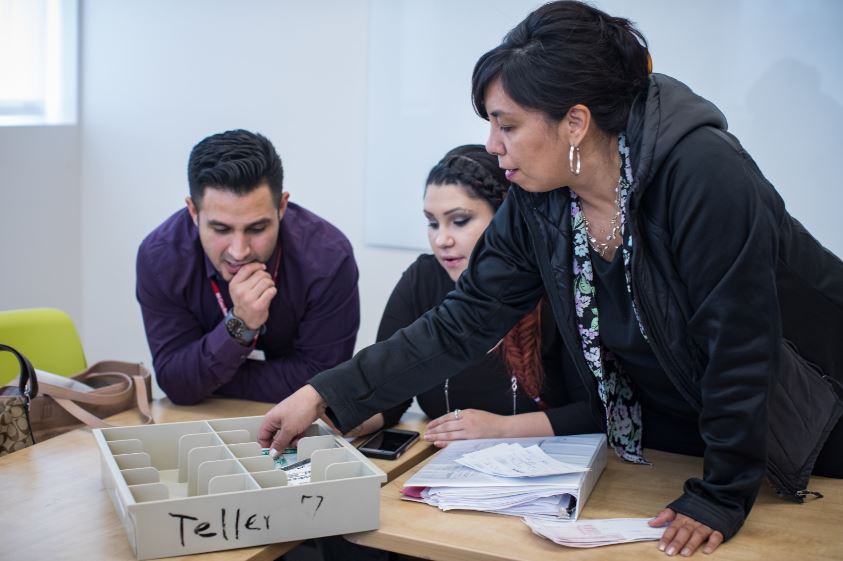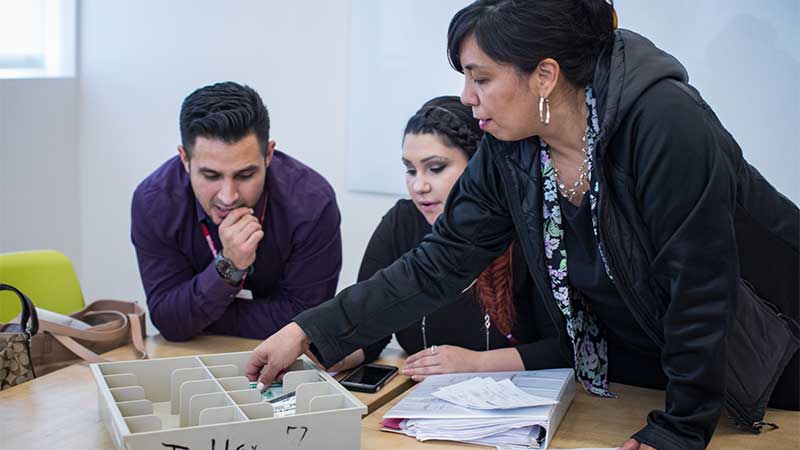
By Julie Johnson and Haley Glover
People are struggling right now to find jobs, pay bills, and care for family. Located within those struggles is the need to upskill or reskill to be equipped for available jobs and better opportunities. Community-based organizations (CBOs) provide a critical means of support. They create new pathways to education and employment and help fill gaps for career guidance and navigation for institutions with limited capacity. They are helping meet adult learners’ needs, especially now when they are most urgent.
Mi Casa Resource Center in Colorado is one example. Mi Casa, a Latina-led organization, has been training and educating the Hispanic and Latino community in the Denver region for the past 40 years as part of its mission to advance family prosperity. In Fall 2019, the group joined Lumina’s All Learning Counts initiative to develop banking and financial services pathways with Community College of Aurora (CCA) and Metropolitan State University of Denver (MSU Denver).
Learners at Mi Casa can earn a financial services training certificate that leads to entry-level positions in banking and financial services. From there, they can earn up to nine credits via prior learning assessment (PLA) at Community College of Aurora toward a 16-credit banking essentials certificate. Learners who choose to continue toward an additional CCA certificate can transfer to MSU Denver for a B.S. in banking with 32 credits from CCA and another potential 25 credits toward the degree.
Mi Casa, CCA, and MSU Denver have worked in close partnership to create this pathway. As a CBO, “Mi Casa understands the needs of its community and how to guide adult learners in moving along and in and out of pathways,” said Georgia Reagan, project director at Mi Casa. The group works with institutional partners to address the complexity and barriers related to enrollment, transfer, and gaining credit for non-institutional learning. Mi Casa has developed relationships with advisers, academic leaders, and other key student service offices at CCA and MSU Denver to ensure its learners can successfully enroll and progress through this pathway.
When Mi Casa reached out to its community in the early months of the pandemic, many people shared their need for one-on-one career and education coaching. As part of the Lumina grant, Mi Casa hired a student services coordinator to guide learners along training and education pathways. The hire couldn’t have come at a better time.
“Mi Casa has the bandwidth to support students during this time in a way that institutions may not have,” said Bri Barnes, student services coordinator.
Bri contacted everyone who completed the Mi Casa financial services training program in the past two years to let them know about the opportunity of this new pathway and to connect them to the support services Mi Casa provides. Services include helping participants navigate PLA exams and college enrollment. Mi Casa stays connected with participants who are unable to start immediately due to pandemic challenges but hope to engage in the coming months.
Mi Casa is opening doors of possibility for those who never expected to engage in post-high school education. In one instance, Lisa, a current bank employee and 2019 alumna of the financial services training, was encouraged by Mi Casa to take a PLA exam and then another, helping to build her confidence. Lisa recently completed four PLA exams, scoring 100% on one of them, and will begin classes at CCA next month. “I had all but given up on college due to my adult-onset testing anxiety, but now I plan to have a Banking Essentials Certificate completed during the Spring 2021 semester,” Lisa said.
Mi Casa is also engaging local industry partners. In addition to education, Mi Casa wants to ensure participants can move into jobs at any point in the upskilling and reskilling process. Westerra Credit Union of Denver was so supportive of the opportunity for its entry-level tellers to continue their education that it provided funding toward PLA exams and enrollment in CCA.
Mi Casa is able to demonstrate the value of upskilling and reskilling to its community. Its marketing materials show how participants can increase their salary by $20,000 through promotion to mid-level positions, which requires the further education this pathway provides. Moreover, Mi Casa shows how demand is greater for mid-level financial services positions rather than entry-level positions. On the education front, Mi Casa lets participants know that the first certificate at CCA will only cost about $400 and if they follow the pathway and complete additional PLAs through to the B.S. in banking at MSU Denver, participants will realize approximately $18,000 in savings for the degree.
As colleges and university grapple with how best to support and serve adult learners during and after the COVID pandemic, working with CBOs like Mi Casa and others will be essential to create a broader learning ecosystem that recognizes non-institutional learning and provides higher-touch support than institutions can offer on their own.
Julie Johnson is the founder and principal of StrategyForward Advisors, a higher education policy and strategy consultancy in Washington D.C. She is Lumina Foundation’s project consultant for All Learning Counts.
Haley Glover is a strategy director at Lumina Foundation, leading mobilization strategies focused on communities and institutions of higher education.
